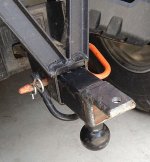Sodo
Elite Member
- Joined
- Apr 21, 2012
- Messages
- 3,300
- Location
- Cascade Mtns of WA state
- Tractor
- Kubota B-series & Mini Excavator
Weldermike, those are nice welds. You are an artist. However I'm not convinced you know about actual weld strength, or structure though, and what welds will bust (like a farmer would for example). Do you build stuff for yourself? Projects & repairs etc?
Is it possible that definition of "non thread" is a welding thread that "the Arcs" are not able to control?
Anyway I highly doubt that the generating setup you could envision, would be as quiet and easy to use for other stuff as having a pair of Hondas around. And you don't do "projects", you'd have to check with someone who does (to offer real advice). I will admit that the Miller salesman 'got me' but that's his job and he did it well but I'm still happy with the welder because it will do stick too (and TIG with more $$) and it's easy to throw it in the truck.
This is because a groove weld on 3/8" test plate will pass the bend test. Thank you for admitting it, I know it was difficult.
You could have written: (as a welding expert on a hobby/maintenance welding forum) "If you encounter occasional 3/8" thick welding tasks, a 120v MIG can do the job by compensating with a groove, or multi-pass whereas with a larger machine, this may not be necessary.
I would change that a little to say, if you already have a larger MIG, don't bother buying a 120v MIG. Also note that "duty cycles" is only for pro welding. Nobody would setup a pro, and have a fitter preparing welds for a pro with a 120v welder. Duty cycle is irrelevant.
If you already have a stick welder, a 120v MIG can become your favorite tool for any repair or project 1/4" and less. If you buy a 120/240v MIG, such as a miller211, you might never use that stick welder again.
I guess some just like punishment.:confused3: This is a non thread. A Multi-Matic 200 is a $2000 machine!:shocked: Comparing it to the $199 specials isn't even close. Myself, for $2000 plus the cost of two Honda inverter generators could come up with a much better welding and/or generating set up for less money.
Is it possible that definition of "non thread" is a welding thread that "the Arcs" are not able to control?
Anyway I highly doubt that the generating setup you could envision, would be as quiet and easy to use for other stuff as having a pair of Hondas around. And you don't do "projects", you'd have to check with someone who does (to offer real advice). I will admit that the Miller salesman 'got me' but that's his job and he did it well but I'm still happy with the welder because it will do stick too (and TIG with more $$) and it's easy to throw it in the truck.
I'm not sure doing a groove weld on a 3/8" test plate is a definitive test for a 120 volt MIG. Groove welds by design make full penetration easier to achieve. I think a fillet weld break test would give a better idea of what it's limits are.
This is because a groove weld on 3/8" test plate will pass the bend test. Thank you for admitting it, I know it was difficult.
You could have written: (as a welding expert on a hobby/maintenance welding forum) "If you encounter occasional 3/8" thick welding tasks, a 120v MIG can do the job by compensating with a groove, or multi-pass whereas with a larger machine, this may not be necessary.
I don't think there are many people that will tell you a 110 mig is not worth having and they are fine IMO for 3/16 and down light duty cycles. However, when someone says 'what welder should I buy' and this being a tractor forum I assume the welder will also be used to repair things like tractors and implements. If you are going to buy one welder and will weld 1/4" and up you are doing yourself a disservice buying a 120v only machine. So I'm going to say it-if you are only going to buy one welder don't buy a 120v.
I would change that a little to say, if you already have a larger MIG, don't bother buying a 120v MIG. Also note that "duty cycles" is only for pro welding. Nobody would setup a pro, and have a fitter preparing welds for a pro with a 120v welder. Duty cycle is irrelevant.
If you already have a stick welder, a 120v MIG can become your favorite tool for any repair or project 1/4" and less. If you buy a 120/240v MIG, such as a miller211, you might never use that stick welder again.
Last edited:



